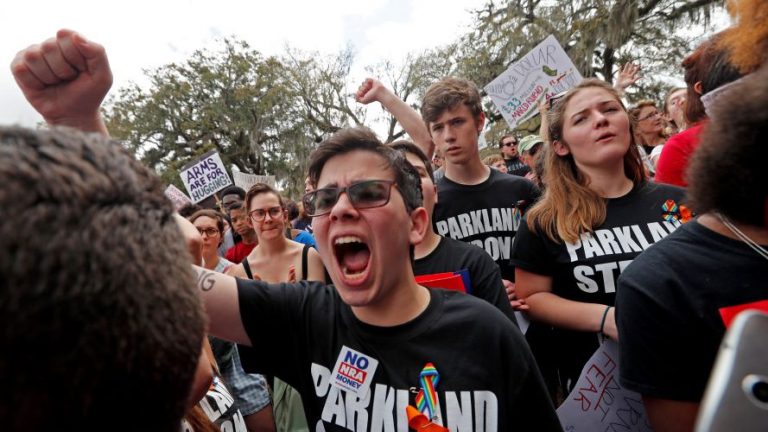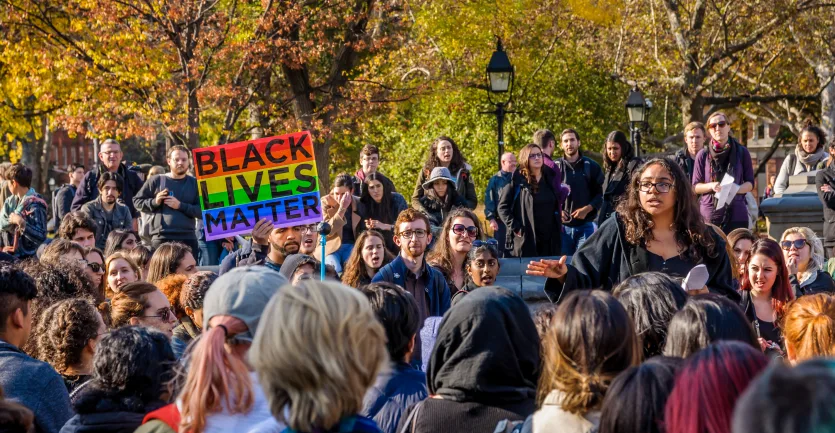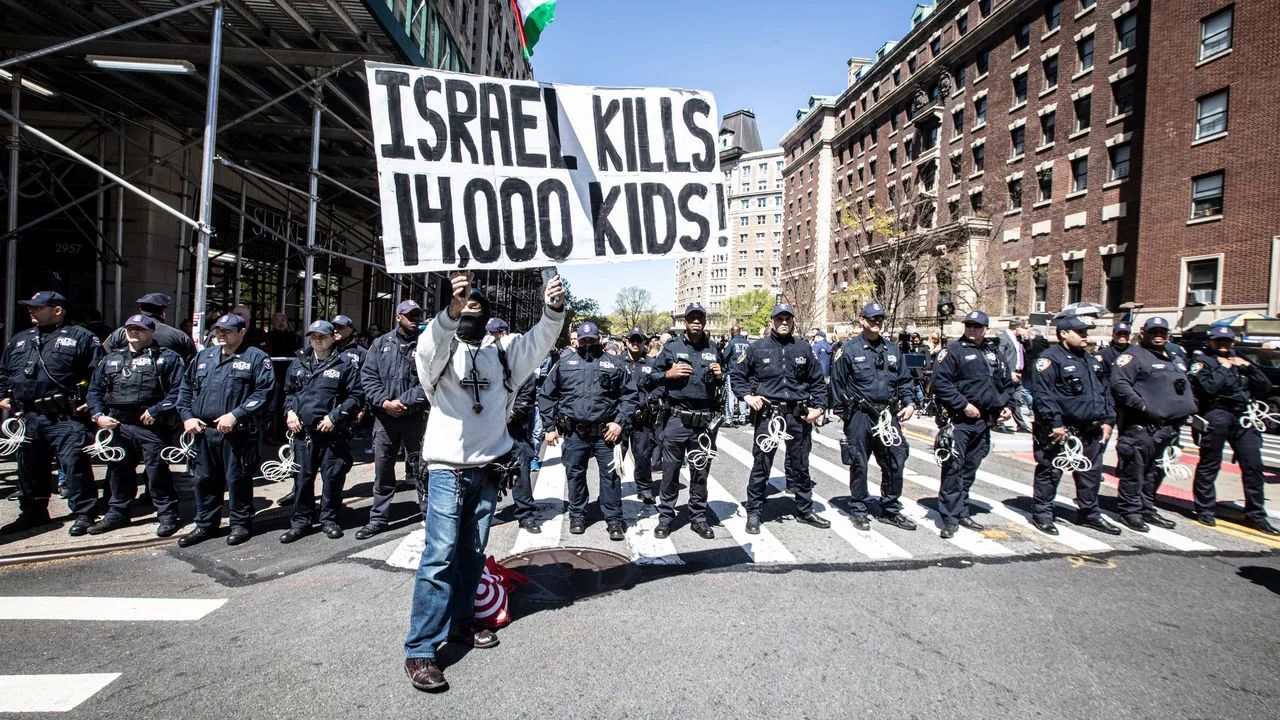
America has for years been a polarized powder keg waiting for the spark to ignite the fuse
By Tom Arms
America has for years been a polarized powder keg waiting for the spark to ignite the fuse. It has come in the form of student protests against American support for Israel.
Protesters, counter-protesters and rent-a-mob have violently coalesced around the conflicting fates of Palestinians and the State of Israel.
As of Friday demonstrations have broken out on 140 college campuses in 45 states. More than 2,000 students have been arrested by police storming barricaded encampments and university buildings with riot gear.
President Joe Biden is trying to thread his way through the oft conflicting principles of freedom of speech and the rule of law. “There’s the right to protest but not the right to cause chaos,” he said. At the same time he is standing firm on his support for Israel while privately bemoaning the fact that he is not being given sufficient credit for pressuring the government of Benjamin Netanyahu.
 The political result could be a November victory for Donald Trump as young people continue their Gaza protest by boycotting the polls and the older generation vote for the strong man politics of Trump.
The political result could be a November victory for Donald Trump as young people continue their Gaza protest by boycotting the polls and the older generation vote for the strong man politics of Trump.
But what do the protesters want? It varies. Some what the total destruction of Israel. Others are focused on a ceasefire and the two-state solution. Still others have been drawn to the barricades by the issue of free speech. Counter-protesters fear that Israel and Jews in general are facing the problems of the 1930s. Rent-a-mob just sees an advantage in chaos.
Two issues, however, stand out: An end to the US government military aid and other support for the state of Israel, and divestment of universities in companies investing in Israel. The first is a long way off and may never be reached. The second is more possible. Both could have a serious impact on Israel and the Middle East.
There is no appetite among either the Democratic or Republican political establishment for an end to aid for Israel. Congress has just approved $14 billion package for the Jewish state. Since 1948 the US government has provided Israel with $300 billion. Nearly 20 percent of Israel’s defense budget is paid by the US.
Israel’s democracy is developing disturbing flaws. But it is the only democratic country in a sea of autocracies and America’s sole true-blue ally in a strategic region of the world. Stopping aid would also remove any influence that Washington has over Israel’s increasingly erratic governments. Many think that American influence is questionable. But at the moment it is holding back the Israelis from attacking Rafah and possibly Iran as well.
Affecting investment in Israel is another matter, especially investment by university endowment funds. American universities are flush with cash. Harvard alone has an endowment fund of $50.7 billion. The endowment funds of the top 200 American colleges total $840 billion plus. Northwestern University and Johns Hopkins University have already negotiated deals with students to end protests in return for talks on divestment of university funds in companies that invest in Israel and armaments production.
As a political tool divestment works. Starting in 2012, student-based climate change activists started to demand that endowment funds withdraw from fossil fuel companies. As of July 2023 a total of 1,593 institutions worldwide (not just educational) with assets of $40.5 trillion had begun or had committed to some form of fossil fuel divestment.
 And this financial weapon has had an impact. Research by Oxford University’s Smith School of Enterprise and the Environment found that divestment has seriously hit the share prices of fossil fuel companies and affected companies’ ability to conduct research and identify new fossil fuel sources. “The outcome,” reported the researchers, “of the stigmatization process poses the most far-reaching threat to fossil fuel companies. Any other direct impact pales in comparison.”
And this financial weapon has had an impact. Research by Oxford University’s Smith School of Enterprise and the Environment found that divestment has seriously hit the share prices of fossil fuel companies and affected companies’ ability to conduct research and identify new fossil fuel sources. “The outcome,” reported the researchers, “of the stigmatization process poses the most far-reaching threat to fossil fuel companies. Any other direct impact pales in comparison.”
The Israeli economy depends heavily on foreign direct investment, especially American. More than 2,500 American companies operate in Israel and total American investment at the end of 2023 was $40.4 billion. The US is Israel’s number one trading partner. A total of 26.5 percent of Israel’s trade is with America. US-Israeli economic ties contributed mightily to Israel’s healthy 6.7 percent growth rate at the end of 2023.
From the point of view of student demonstrators, taxes drawn from a successful Israeli economy help to finance the country’s military which is the second largest in the world per head of population.
 World Review
World Review
Germany’s far-right Alternative for Deutschland (AfD) party has problem in Thuringia. The East German Lander is an AfD stronghold, but their main candidate, MEP Maximilian Krah, has become a non-person.
The reason for his disappearance from the campaign for the European Parliament is the arrest of his aide Jian Guo on charges of spying for China. Krah himself, may not be above suspicion. He is known as one of the Asian giant’s biggest backers in the European Parliament.
The case of Jian Guo is only one of several scandals affecting AfD candidates for June’s European parliament elections. There have also been allegations that another AfD politician, Petr Byrstron, was paid $21,300 by a Russian disinformation network.
The ensuing political disgrace appears to be having effect on the electorate. In December, opinion polls showed the AfD with 23 percent of the national German vote. Another poll at the end of April showed them with the support of only 16 percent of the electorate.
In the meantime, Herr Krah’s name remains on the ballot in Thuringia. It has to. Once the parties submit their list of candidates then their names cannot be removed. Krah’s name is right at the top. But he is at the bottom of the list for speaking opportunities.
___________________________
Compromise appears to be in the air in the Hamas-Israel talks in Egypt. Israel is talking to negotiators about a six-week truce—possibly longer. Hamas is saying that it is looking at the latest proposals in a “positive light”.
So, what are the proposals? Specifics are a diplomatic secret. But what can be gleaned so far indicates that international pressure on Israel and Israeli pressure on Hamas is wringing concessions out of both sides.
A long truce will almost certainly mean the end of Benjamin Netanyahu’s pledge of total victory and the destruction of Hamas. But in return he wants to release of about 100 hostages which means that Hamas will have to relinquish their only bargaining chip.
The proposal currently on the table would call for a phased deal which American, Qatari and Egyptian mediators hope will lead to a permanent ceasefire.
The first phase would be the release of all female hostages in exchange for an undetermined number of Palestinians held in Israeli prisons. Once the initial exchange is completed Israeli troops would withdraw from the coastal road in Gaza. This would facilitate the movement of humanitarian aid and allow displaced Palestinians to return to their homes in northern Gaza. Once northern Gaza is re-opened the remaining hostages would be released along with the remains of hostages who have died in captivity. Israel would also release another batch of Palestinian prisoners.
Now comes the tricky part. After all the hostages have been released, the mediators hope that the two sides will enter into indirect negotiations for a long-term ceasefire/peace plan. This requires a leap of faith on the part of Hamas who fear that once the last hostage is returned, Netanyahu will renege on any peace commitments. For this reason, Hamas may continue to hold onto soldier hostages.
The final stage, if it is reached, may also involve a five-year reconstruction program for Gaza. Last week the UN released a report which said rebuilding Gaza would cost $18.5 billion and take more than 15 years. Who foots the bill is uncertain.
The plan is peppered with sticking points and pitfalls and leaves open the vitally important issue of the long-term settlement. Netanyahu is facing heavy domestic pressure from two conflicting ends. Thousands of people have joined weekly demonstrations calling on him to reach a hostage deal immediately. At the same time, hard-liners in his Cabinet have threatened to bring down the government if he ends the war.
The Biden administration, which provides Israel crucial military and diplomatic support, says it opposes a Rafah invasion unless Israel provides a “credible” plan for protecting civilians there.
The US has called for a long-term two-state plan that includes a return to Gaza of Palestinian Authority, which was ousted from the coastal strip by Hamas in 2007. Under American plans, the authority would eventually become the government of a Palestinian state on the West Bank and in Gaza. Netanyahu and his right-wing government reject a role for the Palestinian Authority in Gaza and insist that they will never allow a Palestinian state.
Israel wants open-ended freedom of action for its military in Gaza. The Biden administration, Hamas and the rest of the world say they won’t accept a return of Israeli military occupation of the Gaza Strip.
____________________________
The word “agent” is nearly synonymous with “traitor” and “spy” in Russia and its tiny Caucasian neighbor Georgia. That is why there was an outcry in 2012 when Russia passed legislation requiring ngo’s and journalists who receive more than 20 percent of their funding from overseas to register as “foreign agents.”
It is also why thousands of Georgians rioted in the streets of Tbilisi when the government introduced identical legislation. The police pulled out water cannon and tear gas. Fifty-six people were arrested and scuffles broke out in parliament.
The protests were held because Georgians want to join the EU and NATO. In fact, the ambition is written into their constitution. Both Brussels and Washington have condemned Georgia’s Foreign Agents Bill and said it conflicts with the values of the EU and NATO. Furthermore, it places a question mark over Georgia’s membership of both organizations.
The problem is that Vladimir Putin casts a long shadow over Georgia. For centuries the Black Sea nation was part of the Russian Empire. Joseph Stalin was from Georgia. In 2008 Russia invaded and Georgia lost the provinces of South Ossetia and Abkhazia [Ma1].
Following the Russian invasion of Ukraine, Georgia provided humanitarian assistance to Ukraine and sheltered Ukrainian refugees who fled to its shores across the Black Sea. But it faced American and EU anger when it refused to join sanctions or provide military assistance. Nikoloz Samkharadze, chairman of the Georgian parliament’s Foreign Relations Committee, explained the government’s reluctance: “Georgia is the most exposed country in the world to Russian aggression.”
The ruling Georgia Dream Party reflects the country’s diplomatic schizophrenic dilemma. In a parliamentary resolution passed in December 2020 the party recommitted itself to seeking membership of the EU and NATO. But in the same resolution it added that the Georgia sought a “pragmatic and principled” relationship with Russia.
The Georgian man, woman and child in the street are not so concerned about the diplomatic nuances. They just want protection from the hungry Russian bear. Membership of the EU and NATO will provide that and they are opposed to anything that might prevent the connection.
The Gaza War has found its way into British local politics. In this week’s local elections pro-Palestinian voters in the northwest town of Oldham bucked the national trend to oust the Labour Party from control of Oldham Council.
Overall, Labour had its best result in 40 years. But leader Keir Starmer’s pro-Israeli stance alienated Muslim voters who normally cast their ballots for Labour. The party’s position In Oldham was not helped by the defection of two Labour councillors, Nyla Ibrahim and Akhtar Shoab to the ranks of pro-Palestinian independents.
Two conservative councillors—Naweed Chowham and Abdul Wahid—also switched to become pro-Palestinian independents in protest against the conservative government’s support for Israel.
The result was that Labor’s one-seat majority on the 60-seat council disappeared, although it still has the most seats—27.
This week’s election for roughly half of Britain’s local authorities was the last big test for the general election which has to be held by January. It was also the platform for a parliamentary by-election in Blackpool South which Labor won with a massive 26 point swing.
The ballot counting for all the local authority elections will not be completed before this article goes into print, but the projections are that the conservatives will lose 500 council seats—about half the contested seats.
_________________
 Tom Arms is foreign editor of Liberal Democrat Voice and author of “America Made in Britain” and “The Encyclopedia of the Cold War.”
Tom Arms is foreign editor of Liberal Democrat Voice and author of “America Made in Britain” and “The Encyclopedia of the Cold War.”
[…] Read: Observations of an Expat: Campus Powder Keg […]